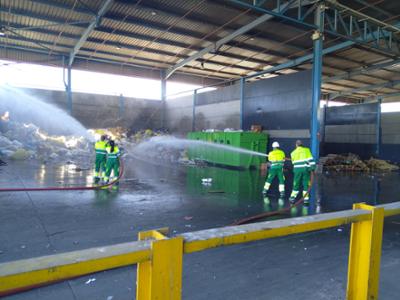

New fire risks for Spanish industry
Photovoltaic panels on roofs and lithium-ion batteries in recycling facilities have increased the risk of fire for many industrial facilities, according to TECNIFUEGO. The Spanish insurance sector estimates that more than 120,000 fires occur every year, with insurers paying out a total of 379 million euros. The average payout for industrial fires is €15,187 per fire.
Globally, fires are the main cause for material losses in industry, according to the Spanish Association of Fire Protection Companies (TECNIFUEGO). The Spanish insurance sector estimates that more than 120,000 fires occur every year, with insurers paying out a total of 379 million euros. The average payout for industrial fires is €15,187 per fire. The environmental impact of this type of fire must also be taken into consideration, as well as job and production losses and the knock-on effect on the local and national economy.
In addition to this, however, according to TECNIFUEGO the risk of fire in industrial activity has increased due to new factors: the installation of photovoltaic solar panel on roofs and the presence of lithium-ion batteries at recycling plants. This has led to greater demands from insurance companies focused on fire prevention.
Photovoltaic solar panels
Photovoltaic solar panels have become widespread in Spain, due to the hours of sun in our land, the low prices of solar panels, improved systems, and the promotion of self-consumption of electricity (Royal Decree 244/2019 of 5 April, on self-consumption of electricity).
According to data collected by the association of photovoltaic producers and installers, UNEF (Unión Española Fotovoltaica), in 2018, 261.7 megawatts (MW) of new photovoltaic power was installed in Spain, a 94% increase compared to 2017. This trend will multiply over the coming years, and so will the risk of fires. In the industrial sector, growth in Spain was 47% in 2022, with panels installed on roofs being the most significant type.
Waste management
The other great challenge facing industry is waste management. Since China closed its waste management system in 2021, waste management has only become more complicated and expensive, and has also increased in volume and weight. The higher the number of facilities, the higher the number of fires. According to data from waste management companies, 109 waste management plants caught fire in Spain in 2023. In other words, a plant burns every three and a half days. This figure is similar to those of the last three years (2021, 2022 y 2023) in which more than 100 fires occurred, a number much higher than decades ago, when incidents were one-offs.
On this national phenomenon, the Guardia Civil has put the hypothesis of arson on the table, according to its expert reports. The phenomenon is so striking that the International Criminal Police Organisation (INTERPOL) has established that environmental crime is the fourth most lucrative type of criminal activity, just behind counterfeiting. Meanwhile, the Guardia Civil's Nature Protection Service (SEPRONA) investigates any fire at a recycling plant on suspicion of arson. Some of these fires can even generate millions of euros in profits, as recycling waste entails costs that can be saved if it is simply burnt, according to TECNIFUEGO.





